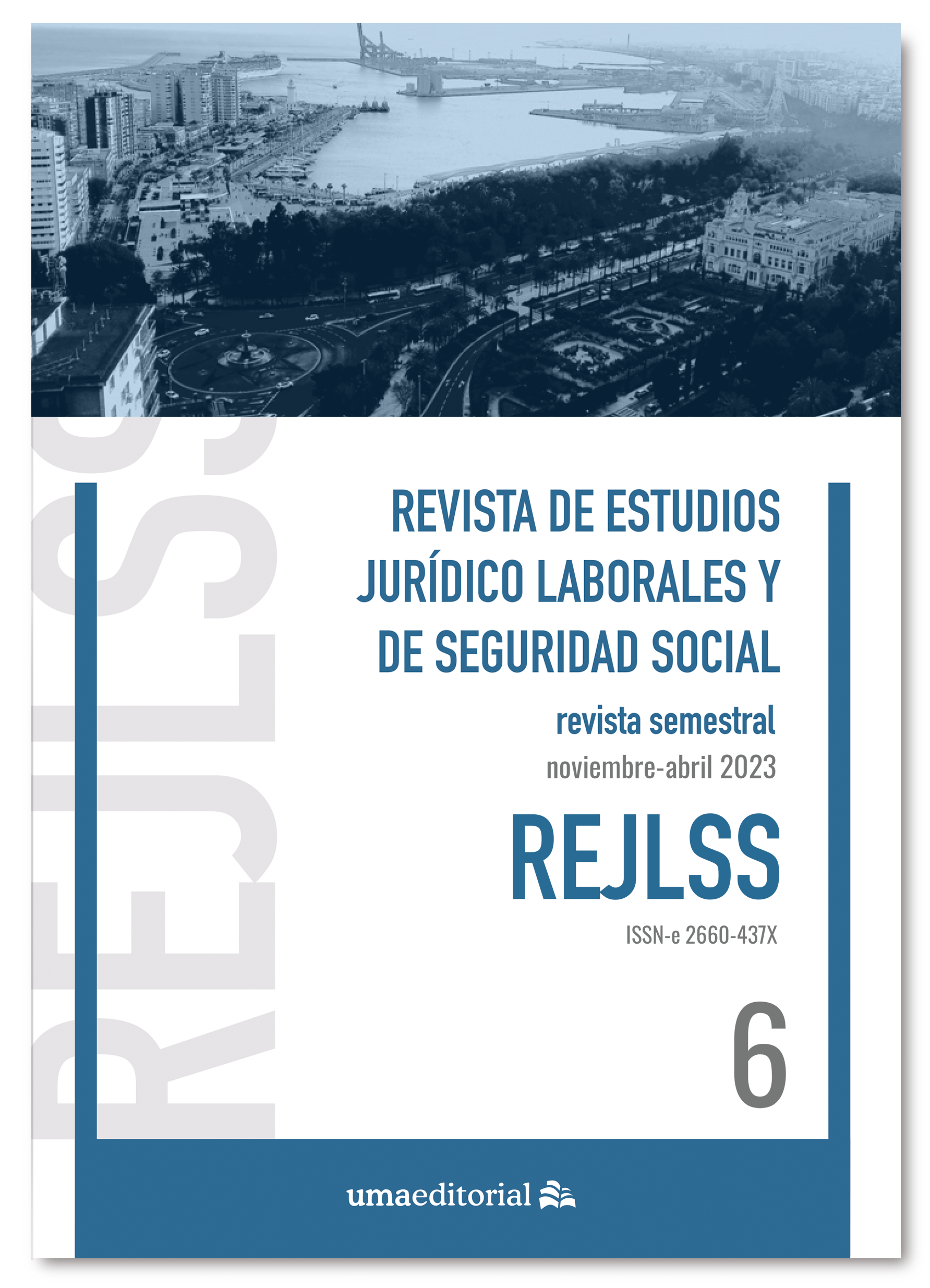The Regulation of Telework in Public Employment
Situation and future prospects
DOI:
https://doi.org/10.24310/rejlss.vi6.16035Keywords:
telecommuting, public employment, Public Administrations, General State Administration, regulation, developing, prospectsAbstract
Remote work, in its several modalities, suffered a dramatic boots as a consequence of Covid-19 pandemic. This article anayzes the changes in the teleworking regulatory framework in the public employment field that has been initiated with new article 47bis of the Basic Statute of Public Employees, The precept conceptualizes this particular form of work and determines its basic characteristics, but it only constitutes the starting point of a complete regulation of remote work that must be approved by each Administration thorough a necessary negotiation process between the parties involved. The author analyses as well the Royal Decree draft that develops the regulation of remote work in the General State Administration.
Downloads
Metrics
Publication Facts
Reviewer profiles N/A
Author statements
Indexed in
-
—
- Academic society
- N/A
- Publisher
- Universidad de Málaga. UMA Editorial
References
Belzunegui Eraso, A., “El teletrabajo en las Administraciones Públicas. Presente y claves para el futuro”, Instituto Nacional de Administración Pública, Colección INNAP Investiga, Madrid, 2022.
Gala Durán, C., “El teletrabajo en las Administraciones Públicas”, Revista Trabajo, Persona, Derecho y Mercado, núm. 3. 2021.
Gallego Moya, F., El teletrabajo: balance del primer año de negociación colectiva y aplicación judicial, Editorial Aranzadi, Navarra, 2021.
Jiménez Asensio, R., “El marco regulador de las Administraciones Públicas y en las entidades de su sector público”, Revista Vasca de Gestión de Personas y Organizaciones Públicas, núm. 4, 2021.
López Vico, S., El teletrabajo tras la pandemia del Covid-19, Ediciones Laborum, Murcia, 2022.
Mellado Ruíz, L., “La nueva regulación del teletrabajo en las Administraciones Públicas: entre la urgencia y la flexibilidad “de mínimos” en tiempo de pandemia”, Revista General de Derecho Administrativo, núm. 57, 2021.
Rastrollo Suárez, J.J., Crisis, reacción y evolución: el teletrabajo en el sector público, Aranzadi, Navarra, 2021.
Rodríguez Iniesta, G., “El trabajo a distancia en las Administraciones Públicas”, en AA.VV. (Alzaga Ruiz, I., Sánchez Trigueros, C. y Hierro Hierro, F.J., Dirs.), El trabajo a distancia: una perspectiva global, Aranzadi, Navarra, 2021.
Sánchez Morón, M., “Objeto y ámbito de aplicación del Estatuto Básico del Empleado Público”, en AA.VV. (Sánchez Morón, M., Dir.), Comentarios a la Ley del Estatuto Básico del Empleado Público, Lex Nova, Valladolid, 2008.
Sala Franco, T., “El Real Decreto-Ley 28/2020, de 22 de septiembre, sobre el trabajo a distancia”, en AA.VV. (Sala Franco, T., Dir.), El Teletrabajo, Tirant lo Blanch, Valencia, 2020.
Vela Díaz, R., “El teletrabajo en el empleo público: puntos clave de su actual regulación”, Lex Social: Revista de Derechos Sociales, vol. 12, núm. 2., 2022.
Vida Fernández, R., “El rol de la representación legal de los trabajadores y de la negociación colectiva para la conciliación de la vida laboral y familiar de la persona teletrabajadora”, en AA.VV. (Durán Bernardino, M., Dir.), Teletrabajo y conciliación de la vida laboral, familiar y personal en clave de género, Dykinson, Madrid, 2022.
Vida Fernández, R., “Las relaciones laborales en las Administraciones Públicas”. Tesis doctoral, DIGIBUG, Granada, 2017. Informe sobre teletrabajo en España, Randstad Research, 2021.
Organización Internacional del Trabajo, Informe: El tiempo de trabajo y el equilibrio entre trabajo y vida primada en el mundo. Publicado el 30 de diciembre de 2022. Ginebra. https://www.ilo.org/global/about-the-ilo/newsroom/news/WCMS_864996/lang--es/index.htm?shared_from=shr-tls
Padilla Ruíz, P., Teletrabajo de los empleados públicos. Realidad o ficción. 2022. https://pedropadillaruiz.es/teletrabajo-de-los-empleados-públicos/
Plan de medidas de ahorro y eficiencia energética de la Administración General del Estado y las entidades del sector público institucional estatal. Orden PCM/466/2022, de 25 de mayo, Acuerdo del Consejo de Ministros de 24 de mayo de 2022. https://www.miteco.gob.es/es/prensa/ultimas-noticias/el-gobierno-aprueba-un-plan-de-medidas-de-ahorro-y-eficiencia-energ%C3%A9tica-en-la administraci%C3%B3n-general-del-estado/tcm:30-540664
Consulta pública sobre el proyecto de Real Decreto de teletrabajo en la Administración General del Estado. https://mpt.gob.es/portal/ministerio/participacion_proyectos/consulta_previa/proyectos/2021/2021-03-31.html
Downloads
Published
How to Cite
Issue
Section
License
In the Revista de Estudios Juridico Laborales y de Seguridad Social (REJLSS) we are clearly committed to a policy of open access to scientific knowledge (See Berlin Declaration).
Those authors who have publications with this journal accept the following terms:
This journal provides immediate free access to its content under the principle of making research freely available to the public. All the contents published in the REJLSS are subject to the Creative Commons license
Attribution-NonCommercial-NoDerivatives 4.0 International (CC BY-NC-ND 4.0)
Copyrights are of two kinds: moral and patrimonial. Moral rights are perpetual, inalienable, non-transferable, inalienable, unattachable and imprescriptible prerogatives. In accordance with Spanish copyright legislation, the authors who publish in REJLSS retain the moral right over their work, as well as the ownership of the patrimonial right, which will be transferred to the University of Malaga for its dissemination in open access.
The patrimonial rights, refer to the benefits that are obtained by the use or disclosure of the works. REJLSS is published in open access and is exclusively authorized to perform or authorize by any means the use, distribution, dissemination, reproduction, adaptation, translation or transformation of the work.
It is the responsibility of the authors to obtain the necessary permissions of the images that are subject to copyright.
Authors whose contributions are accepted for publication in this journal retain the non-exclusive right to use their contributions for academic, research and educational purposes, including self-archiving or depositing in open access repositories of any kind.
The electronic edition of this magazine is edited by the Editorial of the University of Malaga (UmaEditorial), being necessary to cite the origin in any partial or total reproduction.
The authors may adopt other non-exclusive license agreements for the distribution of the version of the published work (eg: deposit it in an institutional telematic archive or publish it in a monographic volume) provided that the initial publication is indicated in this magazine.
Authors are allowed and recommended to disseminate their work through the Internet (eg, in institutional telematic archives or on their website) before and during the submission process, which can produce interesting exchanges and increase citations of the published work.







19.png)
